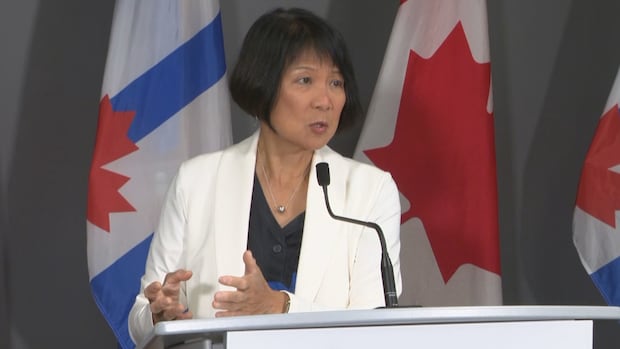Toronto Mayor Olivia Chow says Toronto taxes might have to go up “at least two per cent” to cover shelter spending if the federal and provincial governments don’t reinstate funding for refugee housing that’s left the city with a $107-million deficit.
“We’ve been taking money from the reserve funds in order to continue the services to shelter these refugee claimants,” said Chow at a news conference on Monday.
Toronto’s portion of the Interim Housing Assistance Program (IHAP), a federally-funded program backing municipalities’ efforts to house refugees, was significantly rolled back this year. The IHAP cuts also include a country-wide end to a program that housed asylum seekers in hotels across Canada on Sept. 30, the federal government has said.
The city will only receive funding for 26 per cent of what it is projected to spend sheltering refugees and asylum seekers, Chow said, but it already spent more under the assumption it would be paid back. She said the federal government has “not been paying their bills.”
The city’s funding from the Canada-Ontario Housing Benefit (COHB), which helps transition people from the shelter system to permanent housing by supplementing costs, was also cut by about 60 per cent for 2026, according to a statement by Chow.
She said she does not want to raise taxes, but it might come down to that or cutting services if the city doesn’t receive funding from other levels of government.
“We can either stop sheltering refugee claimants, leave them on the street, which will make homelessness worse, reversing the progress we made on reducing the number of encampments, or Torontonians will have to pay for it through property taxes,” Chow told the city’s executive committee Monday. “Neither is fair.”
Chow said she “has not given up” on funding from other levels of government, saying she believes they “want to do the right thing.”
The executive committee voted Monday to adopt Chow’s recommendations to request the federal government pay its promised funding. It also voted to request the province increase it’s COHB, which Chow said will be just under $8 million next year, compared to the nearly $20 million the city is receiving in 2025.
Toronto has received a “top-up” in COHB funding for the last two years, according to a statement from a spokesperson for Rob Flack, Ontario’s housing and municipal affairs minister. The statement said the formula to calculate the COHB is the same, but the federal government decided not to give Toronto the extra funding this year.
IRCC cuts result of fewer asylum claims
Immigration, Refugees and Citizenship Canada (IRCC) has said the IHAP cuts are due to a decrease in asylum claims across the country.
“While asylum volumes remain high, they are nearly 40% lower than last year, and demand for temporary accommodations is steadily declining,” the IRCC said in a statement in August.
“IRCC will continue to work closely with all partners and monitor trends to ensure effective support,” the federal department said in a statement Monday.
Refugee John Mochama told CBC Toronto that his time in a federally funded hotel room — as part of the federal program ending this month — helped him get on his feet long-term.
“When I stayed in that hotel for a period of six months, I was able to secure a job,” he said. “Then I got a home, where I am now. I want to thank the people of Canada.”
But others haven’t been so lucky, and advocates worry that could get worse with funding cuts.
On Monday, community groups and city councillors put out a statement echoing Chow’s demands, saying the decision to cut these programs will put lives at risk. Of the clients in Toronto’s shelter system, 40 per cent are refugees, according to the group statement.
Community groups fear ‘humanitarian crisis’
In 2023 a surge of refugee claimants led to a shelter crisis in the city. People slept on the streets outside of at-capacity shelters. With the public system overwhelmed, community groups stepped in with support.
Kizito Musabimana, executive director of the Rwandan Canadian Healing Centre, said community relief efforts in 2023 were demanding and some members are still recovering mentally and financially.
“Our community is not ready to take on the work of the federal government,” he said.
Eddie Jjumba, a community leader with the African Canadian Collective and minister for community faith groups, said he is worried about a repeat of what happened in 2023.
Jjumba said his community groups spent “everything [they] had” trying to help out.
“We came to a point where we could not function because of how much the need was,” he said.
Diana Chan McNally, a member of the Housing Rights Advisory Community Committee in Toronto, told reporters she worked to provide relief during the 2023 shelter trouble and said the federal government is putting the onus of housing refugees on the municipality and community, when it should be their responsibility.
“[The federal government] should absolutely be paying this money to ensure that we do not have a crisis, a humanitarian disaster on our hands in the city of Toronto,” she said.
